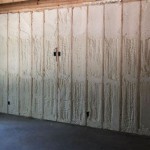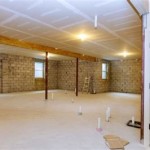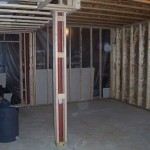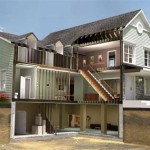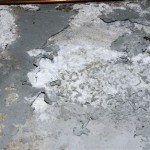Cost to Finish a Basement in Ontario
Finishing a basement in Ontario represents a significant home improvement project with the potential to add substantial living space and increase property value. However, understanding the associated costs is crucial for budgeting and planning. The final expense can vary widely based on a multitude of factors, including the size of the basement, the complexity of the design, the quality of materials, and the location within Ontario. This article provides a comprehensive overview of the costs involved in finishing a basement in Ontario, offering a framework for homeowners to estimate their potential investment.
The cost to finish a basement in Ontario is generally calculated on a per-square-foot basis. While precise figures fluctuate depending on prevailing market conditions and specific project requirements, a typical range falls between $40 and $100 per square foot. This range encompasses various aspects of the project, from framing and insulation to electrical work, plumbing, drywall, flooring, and finishing. It is important to note that this is a broad estimate, and certain elements can significantly push the price higher.
Several factors contribute to the overall cost variation. The following sections will outline the key elements influencing the final financial commitment.
Key Point 1: Influential Factors on Basement Finishing Costs
The first critical consideration is the size of the basement. Naturally, a larger basement will require more materials and labor, directly impacting the overall cost. Square footage determines the amount of framing lumber, drywall, insulation, flooring, and paint needed.
The complexity of the design also plays a significant role. A simple, open-concept design will generally be less expensive than a layout that includes multiple rooms, custom built-ins, or intricate architectural details. The addition of bathrooms, kitchens, or wet bars significantly increases both material and labor costs due to plumbing and electrical requirements.
Geographic location within Ontario is another important factor. Labor costs and material prices can vary significantly between urban centers like Toronto and more rural areas. Obtaining quotes from multiple contractors in the specific area is crucial to understanding local market rates.
The choice of materials also directly influences the cost. Opting for high-end flooring, premium fixtures, and custom cabinetry will substantially increase expenses compared to using more budget-friendly options. Similarly, energy-efficient insulation and high-quality drywall can add to the initial investment but may provide long-term savings on utility bills.
Necessary permits and inspections are also unavoidable expenses. Building permits are required for most basement finishing projects, and the cost varies depending on the municipality. Inspections are conducted at various stages of the project to ensure compliance with building codes, and these fees must be factored into the budget.
Finally, unforeseen issues can arise during the project. These may include dealing with moisture problems, correcting structural deficiencies, or uncovering outdated wiring or plumbing. It is prudent to allocate a contingency fund of approximately 10-15% of the total estimated cost to address any unexpected issues.
Key Point 2: Breakdown of Specific Cost Components
Understanding the individual cost components provides a more granular view of the overall expenses. Framing represents a significant portion, typically involving the construction of interior walls to create rooms or define spaces. The cost will vary depending on the quality of lumber used and the complexity of the framing design.
Insulation is crucial for creating a comfortable and energy-efficient living space. The type of insulation chosen, such as fiberglass batts, spray foam, or rigid foam boards, will affect the cost. Spray foam insulation generally offers superior insulation value but is more expensive than traditional fiberglass batts.
Electrical work involves running new wiring, installing outlets, switches, and lighting fixtures. The cost will depend on the number of electrical points needed and the complexity of the wiring system. Hiring a licensed electrician is essential to ensure safety and compliance with electrical codes.
Plumbing is required for adding bathrooms, kitchens, or wet bars. The cost will vary depending on the complexity of the plumbing system and the distance from existing plumbing lines. It is advisable to hire a licensed plumber to handle all plumbing work.
Drywall installation involves hanging and finishing drywall to create smooth interior walls. The cost will depend on the size of the area to be covered and the level of finishing required. Proper drywall installation is crucial for achieving a professional-looking finish.
Flooring options range from budget-friendly choices like laminate or vinyl to more expensive options like hardwood or tile. The cost will depend on the type of flooring chosen and the size of the area to be covered. Installation costs also vary depending on the flooring type.
Painting or wall finishing involves preparing and painting the drywall surfaces. The cost will depend on the type of paint used and the number of coats required. Professional painting services will typically cost more than DIY painting.
Finally, finishing touches such as trim, baseboards, doors, and hardware contribute to the overall cost. The cost will depend on the quality and style of these items.
Key Point 3: Strategies for Managing Basement Finishing Costs
Careful planning and execution can help homeowners manage basement finishing costs effectively. Obtaining multiple quotes from reputable contractors is essential for comparing prices and services. It is crucial to verify that contractors are licensed and insured before hiring them.
Prioritizing needs versus wants can help control spending. Focus on essential elements like framing, insulation, electrical, and plumbing before investing in more luxurious features. Consider deferring non-essential upgrades until later if budget constraints exist.
Choosing cost-effective materials can significantly reduce expenses. Explore alternative flooring options, such as laminate or vinyl, instead of hardwood or tile. Opt for standard fixtures and finishes instead of custom or high-end options.
DIY projects can save money on labor costs, but only if the homeowner possesses the necessary skills and experience. Tasks like painting, drywall finishing, or basic carpentry can be tackled by experienced DIYers. However, electrical and plumbing work should always be handled by licensed professionals.
Careful planning can prevent costly mistakes and rework. Create a detailed design plan before starting the project and ensure that all necessary permits are obtained. Communicate clearly with contractors to avoid misunderstandings and ensure that the project stays on track.
Phased construction can spread out the costs over time. Consider completing the basement in stages, focusing on essential areas first and adding additional features later. This approach allows homeowners to manage their budget more effectively and avoid taking on excessive debt.
Renovating during the off-season can sometimes lead to lower labor costs. Contractors may be more willing to negotiate prices during slower periods, such as the winter months. However, weather conditions can sometimes delay the project during the off-season.
Resale value should be considered when making design and material choices. While it's important to create a space that meets current needs, it's also wise to consider how the finished basement will appeal to potential buyers in the future. Neutral color schemes and timeless designs generally have broader appeal.
In conclusion, finishing a basement in Ontario is a significant investment that requires careful planning and budgeting. By understanding the various factors that influence costs, homeowners can make informed decisions and create a functional and valuable living space. Getting multiple quotes, prioritizing needs, and carefully selecting materials are essential strategies for managing expenses and achieving a successful basement finishing project.

Finishing A 1000 Sq Ft Basement In Ontario Costs Explained

Basement Renovation Costs A Detailed Breakdown Csg

How Much Does It Cost To Renovate A Basement

Basement Renovation Cost In Toronto A Complete Guide 2025

How Much Does It Cost To Renovate A Basement

How Much Does It Cost To Renovate A Basement

Basement Renovation Cost In Ontario Average Price To Finish A Renoduck

Basement Renovation Costs In Toronto Harmony Basements

Basement Finishing Price Calculator Moose Basements

Basement Renovation Costs In Toronto Harmony Basements
Related Posts
